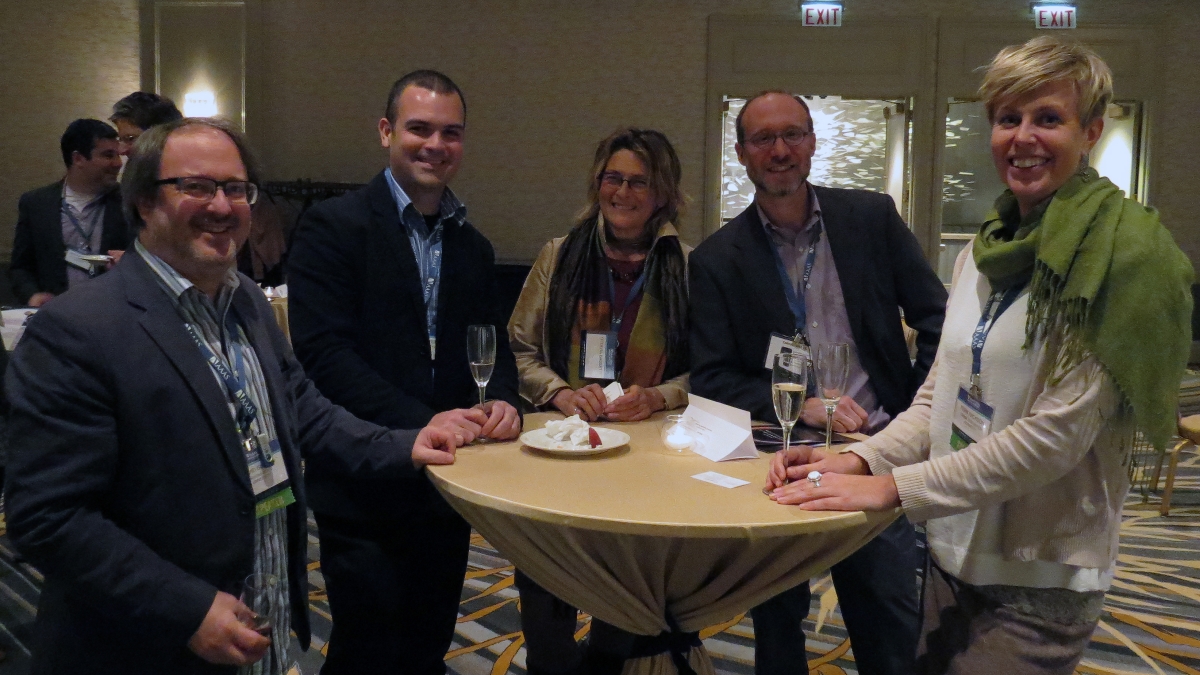ASU-led symposium at AAAS conference examines responsible innovation across cultures, political settings

Synthetic biology and nanotechnology hold the promise of microscopic cleanup crews for toxic spills, tumor-attacking microbes and an inexhaustible fuel supply. But along with these almost too-good-to-be-true rewards lurk risks. The practical challenge of containing microorganisms, the inability to predict all uses of new technologies and the ethics of engineering new life present only a fraction of the reasons researchers should look before, during and after they leap into these new scientific arenas.
Building a capacity to anticipate these challenges of innovation is one of the primary goals of the Center for Nanotechnology in Society at ASU (CNS-ASU), headed by David Guston, who led an international symposium on “Responsible Innovation in a Global Context” at the American Association for the Advancement of Science (AAAS) 2014 conference in Chicago, Feb. 15. Guston is also co-director of the Consortium for Science, Policy and Outcomes (CSPO) and a professor of politics and global studies at ASU.
“Because scientists and engineers have particular goals in mind doesn’t mean that they have the time, energy, talent or inclination to investigate the variety of things that bear on that goal,” said Guston. "Responsible innovation seeks to create a real connection – substantively and procedurally – between folks doing ethical, legal and social implications research with laboratory researchers.”
Traditionally, the model for attempting to control negative impacts of a new technology has included risk assessments and cost-benefit analyses, but these approaches have limitations, said Fern Wickson, a researcher at the Genok Centre for Biosafety in Norway and one of the AAAS symposium panelists. “Embedding social scientists and ethicists into laboratories, enhancing dialogue between the public and scientists, and funding more research on the ethical questions, societal aspects and legal problems of technologies are new ways that the Norwegian government has pursued responsible innovation.”
But while these strategies may result in positive “micro-level changes, they don’t take into account the real-world setting in which we’re operating,” said Wickson. “You have to acknowledge and confront the stronger forces of corporate actors, private interests, political economies and embedded societal values to achieve the degree of change we would need in order to see responsible futures emerge.”
Compounding the challenge of implementing and standardizing responsible innovation at the global level is that these influences exert varying force in different cultural and political settings, and responsible innovation strategies will be more or less acceptable in each of those settings.
“Participation and democracy are at the center of what responsible innovation means, so what does that look like in Brazil, where we don’t have a history of participation in policy debates or decision-making concerning technologies?” said Marko Monteiro, faculty member at the State University of Campinas in Sao Paulo and another of the panelists. “Brazil is much more technocratic than other places. That presents a challenge in our context,” said Monteiro, noting Brazil’s relatively recent transition to a democratic constitution in 1988.
The symposium included additional researchers from Canada, Denmark, Japan and the United Kingdom who have worked on defining and implementing responsible innovation in a variety of societal and political contexts.
Responsible innovation can simultaneously influence those larger cultural settings as well. “An approach that takes seriously responsible science and innovation is going to help support a variety of values from national competitiveness, to societal well being, to environmental protection and sustainability, to democratic self determination,” said Erik Fisher, an assistant professor of politics and global studies at ASU and a third panelist. His Socio-Technical Integration Research project embeds social scientists, humanists and ethicists into laboratories.
All of the panelists are part of the new Virtual Institute for Responsible Innovation, a project funded by the National Science Foundation and housed at CNS-ASU that aims to understand responsible innovation and integrate it in academic, government and corporate settings.
Later this month, the first issue of the Journal of Responsible Innovation, of which Guston is the founding editor-in-chief, will be published by Taylor & Francis. A reception celebrating the launch was held at the AAAS meeting Saturday evening.